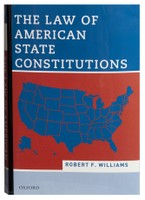
In New Jersey, discussions surrounding the removal of a state Supreme Court justice, as well as a gubernatorial election campaign proposal to cap property tax increases at 2½ percent per year, have revolved around the state constitution.
But what are state constitutions, how do they differ from the federal constitution, and how are they interpreted?
Those are questions Rutgers–Camden law scholar Robert Williams answers in a new book, The Law of American State Constitutions (Oxford University Press, 2009). In the book, Williams describes the evolution of state constitutions over the centuries.
“State constitutions have become much more important in this country,” says Williams, a distinguished professor at the Rutgers School of Law–Camden. “We’re much more familiar with the federal constitution, but each state constitution can be equally important. I felt like it was time to put all of this knowledge into one reference book.”
The treatise is an unprecedented look at how state constitutions perform different functions and have different origins. It draws upon the history of each state constitution and analyzes modern-day interpretation by the courts.
“A lot of the thinking on how government should operate and what rights we should have has gone on in the states,” Williams says. “The state constitutions have changed and evolved much more than the federal constitution. They’ve gotten longer because society and government has gotten more complicated.”
The Rutgers–Camden legal scholar has advised state legislatures and Supreme Courts across the nation on issues related to constitutional development and reform. Williams says state constitutions differ so much from the federal constitution because they include a wide variety of policy provisions.
“They’re loaded with policy decisions,” Williams says. “As a consequence, we have much larger, much more broadly applicable constitutions in the states.”

In New Jersey, Gov. Chris Christie is proposing a constitutional amendment that would cap property tax hikes at 2½ percent per year, a move that Williams says would be an example of a policy provision in the constitution.
“You wouldn’t need anything like that in the constitution because the legislature has the authority to tell local taxing authorities what to do in New Jersey,” Williams explains. “But to put that into the constitution would make it relatively more permanent.”
In the book, Williams explains that there is extensive judicial involvement in state constitutional amendment and revision.
Williams’ book also surveys state constitutions adopted before the federal constitution, their influences on the development of the federal constitution, and their provisions concerning the character, virtue and morality of the state’s people.
“You didn’t see much in the press about state constitutions 20 or 25 years ago,” Williams says. “That’s changed. The book is aimed at judges and lawyers as a reference tool.”
Williams teaches state constitutional law at the Camden Campus of Rutgers, The State University of New Jersey. He is the associate director of the Center for State Constitutional Studies at Rutgers–Camden, and is the widely-cited author of dozens of articles and numerous books on state constitutional law, including State Constitutional Law: Cases and Materials (Lexis Law Publishing, 4th Edition, 2006) and The New Jersey State Constitution: A Reference Guide (Revised Edition, Rutgers University Press, 1997).
A resident of Haddonfield, Williams received his bachelor’s degree from Florida State University in 1967; his Juris Doctor degree from the University of Florida in 1969; and his LL.M. degree from New York University in 1971.
Media Contact: Ed Moorhouse
856-225-6759
E-mail: ejmoor@camden.rutgers.edu